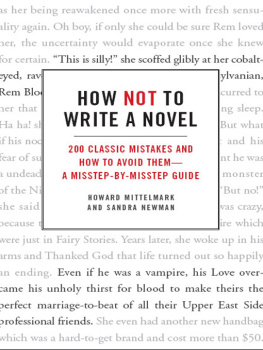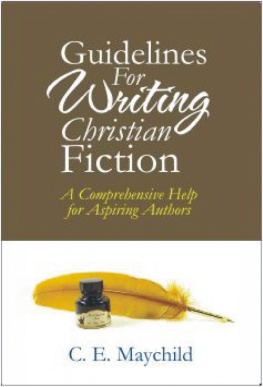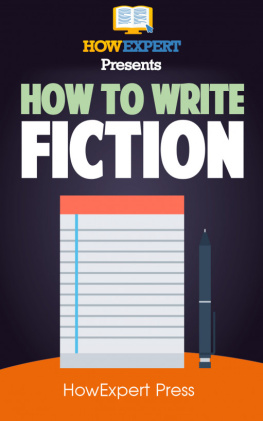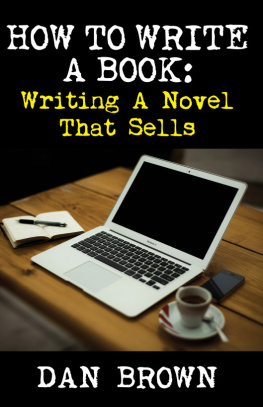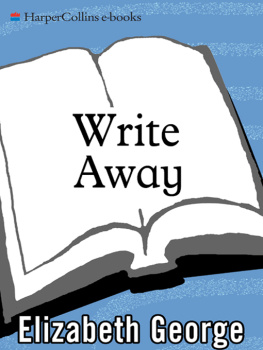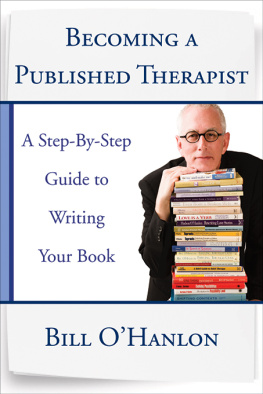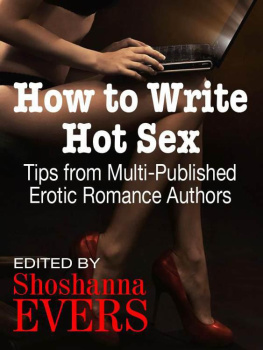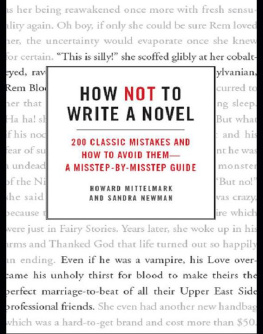Unpublished authors often cite the case of John Kennedy Toole, who, unable to find a publisher for his novel, A Confederacy of Dunces , took his own life. Thereafter, his mother relentlessly championed the book, which was eventually published to great acclaim and earned him a posthumous Pulitzer Prize for fiction.
Yes, we say, that is a strategy, but it is a strategy that demands a remarkable level of commitment from the authors mother, and an even greater commitment from the author. And, of course, it puts a serious crimp in the book tour. But even more to the point, it will work only if you have in fact written a masterpiece that awaits only the further enlightenment of the publishing industry and the reading public to receive the treatment it deserves.
If this is the case, we are no good to you. If there is, however, any chance that your writing could stand some improvement, we can help.
Unpublished novelists can, of course, turn to the innumerable books on writing already available: magisterial tomes from great authors; arc-schemes and plot-generating formulas from less-great authors; inspirational books about releasing the inner artist or freeing the creative mind.
We do not discourage you from reading any of them. The best are themselves good writing, and the more good writing you read, the better a writer you might become. Inspirational books might indeed inspire you, or at least serve as Dumbos magic feather. Even plot wheels are good for a laugh, and you can always while away a merry hour putting together new characters from the Big Box o Traits like a Mr. Potato Head, and then return to writing your novel refreshed and renewed.
But if reading Stephen King on writing really did the trick, we would all by now be writing engrossing vernacular novels that got on the bestseller lists; and it has been demonstrated through years of workshops that the Artist Within tends to make the same mistakes as the artist within everybody else. Furthermore, in trying to write novels to the specifications of a manual, the writer will often feel that her voice and imagination are being stifled, and nobody can fail to notice that for every rule of writing these books present, novels can be found in which it has been broken with great success.
Therefore we saw a need, a service we could provide.
All these many writing books strive to offer distinct, sometimes radically different approaches to writing a novel. But if you locked all their authors in a room and slowly started filling it with water, and the only way they could escape was to reach some consensus on writing, their only hope for survival would be to agree on the things you shouldnt dowhich is to say, the contents of How Not to Write a Novel.
We do not presume to tell you how or what to write. We are merely telling you the things that editors are too busy rejecting your novel to tell you themselves, pointing out the mistakes they recognize instantly because they see them again and again in novels they do not buy.
We do not propose any rules; we offer observations. No right on red is a rule. Driving at high speed toward a brick wall usually ends badly is an observation.
Hundreds of unpublished and unpublishable novels have passed across our desks, so we have been standing here by the side of the road for a very long time. Had you been standing here with us, you would have seen the same preventable tragedies occurring over and over, and you would have made the same observations.
Do not think of us as traffic cops, or even driving instructors. Think of us instead as your onboard navigation system, available day or night, a friendly voice to turn to whenever you look up, lost and afraid, and think How the fuck did I end up here?
Not just a bunch of stuff that happens
As a writer you have only one job: to make the reader turn the page. Of all the tools a writer uses to make a reader turn the page, the most essential is the plot. It doesnt matter if the plot is emotional (Will Jacks fear of commitment prevent him from finding true love with Synthya?), intellectual (But Jack, Synthyas corpse was found in a locked room, with nothing but a puddle on the floor next to her and a recently thawed leg of mutton on the end table!), or physical (Will Jacks unconstitutional torture of Synthya Abu Dhabi, the international terrorist, lead to the location of the ticking bomb?) as long as it compels the reader to find out what happens next. If your reader doesnt care what happens nextit doesnt.
Typically, the plot of a good novel begins by introducing a sympathetic character who wrestles with a thorny problem. As the plot thickens, the character strains every resource to solve the problem, while shocking developments and startling new information help or hinder her on the way. Painful inner conflicts drive her onward but sometimes also paralyze her at a moment of truth. She finally overcomes the problem in a way that takes the reader totally by surprise, but in retrospect seems both elegant and inevitable.
The plot of a typical unpublished novel introduces a protagonist, then introduces her mother, father, three brothers, and her cat, giving each a long scene in which they exhibit their typical behaviors one after another. This is followed by scenes in which they interact with each other in different combinations, meanwhile driving restlessly to restaurants, bars, and each others homes, all of which is described in detail.
A typical plot event in an unpublished novel is when the protagonist gets a disastrous haircut, at a moment when her self-esteem is hanging by threads . This sets the character up for the ensuing Mother thinks protagonist spends too much on haircuts, but is made to see that self-esteem is crucial to mental health scene, the boyfriend doesnt understand characters needs, but finally acknowledges the gendered basis of his priorities, scene, and the taking a bubble bath to relax after stress-filled scenes scene, in which the protagonist mentally recapitulates the previous three scenes. Cue waking up the next morning on chapter 9, with anything resembling a story yet to appear on the horizon.
Sometimes a contemplative prologue will depict the protagonist looking out the window and thinking of all the philosophical conundrums the author will not have time to present in the ensuing narrative. Sometimes the prologue simply presents those philosophical conundrums in a voice that issues from nowhere. Sometimes the prologue dispenses with philosophy completely and presents a protagonist looking out the window thinking about hair products.
A great many plot problems that show up in unpublished manuscripts can be resolved with a single strategy. Know what the chase is, and cut to it. Do not write hundreds of pages without knowing what story you really want to tell. Do not write hundreds of pages explaining why you want to tell the story you are about to tell, why the characters are living the way they are when the story begins, or what past events made the characters into people who would have that story. Write hundreds of pages of the story, or else youll find that what you write will not be shelved in the libraries of the future but will instead form the landfill upon which those libraries are built. In fact, employing any of the plot mistakes that follow will guarantee that your novel will be only a brief detour in a ream of papers journey to mulch.

